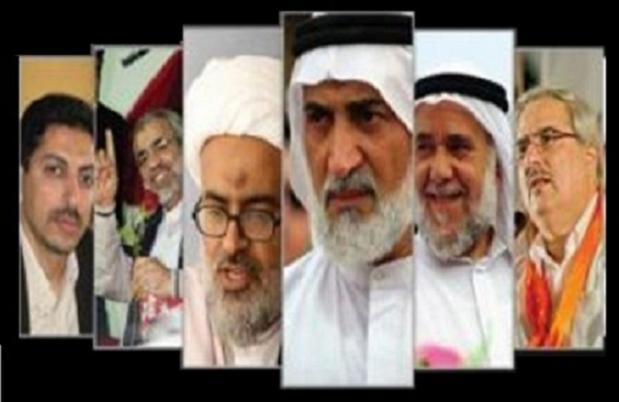Bahrain: British Protectorate, Close Ally Special Report
New in Ceasefire, Politics - Posted on Tuesday, October 11, 2011 9:03 - 0 Comments
By Janet Salmon
Hunger strikers activists: Abdulhadi Al Khawaja, AbdulJaleel AlSingace, Abdulwahab Hussain, Hasan Mushaima and Ebrahim Sherif. (Photo: http://www.bahrainrights.org)
The Background
The Khalifas migrated from Najd to Kuwait in the early eighteenth century and are members of the Utub tribe. Hamad bin Isa Al Khalifa proclaimed himself King of Bahrain in 2002. About half of the Cabinet positions since 2010 have been held by members of the Khalifa family. The Prime Minister, the king’s uncle, Khalifa bin Salman al –Khalifa has been the un-elected Prime Minister since 1971.
Britain concluded a treaty with the Khalifas in 1820, granting them the title of ‘Ruler of Bahrain’. The 1861 Perpetual Treaty of Peace and Friendship was revised in 1892 and 1951. Ian Henderson was recruited by the British in 1970s to establish the security regime and only retired when the EC condemned his use of torture in 1998.
Britain signed similar treaties with the other Gulf Princes. Rulers can’t dispose of territory other than to the U.K., nor can they develop foreign relationships without ‘our’ consent. In return the U.K. will protect these Princes from attack by sea or land.
Why is this relevant today?
The majority Shiite population have campaigned for democracy since 2006. The Khalifas usually arrest the leaders and activists and then offer a Royal Pardon.
In 2011 the demonstrations were so huge, the Saudis and UAE sent in 1600 troops. 400 citizens are in prison for taking part in peaceful pro-democracy demonstrations. 208 have been sentenced, including 81 last week. They went through military courts with little access to lawyers or any sort of legal defence, receiving sentences of 10 years to Life.
Politicians and Lawyers who lost their appeal on 28th October include:
Hassan Mushaima, 63, Secretary General of Haq. LIFE.
Ebrahim Sharif, 53, Secretary General of Waad. LIFE.
Abdul Wahhab Hussein, 57, Spokesperson, Al Wafa. LIFE. Heart problems.
Dr Abdulijalil Al Singacem, 49, Board Member, Haq and Head of Human Rights. LIFE. Paralysed
Abdul Hadi Alkhawaja, 50, prominent human rights lawyers, ex-President of Bahrain Centre for Human Rights and Frontline M.E. co-ordinator. LIFE
Mohammed Hassan Mohammed Jawad, 63, well-known human rights lawyer who campaigns for prisoners’ rights. 15 YEARS.
40 prisoners, including Mushaima, Sharif, Hussein and Alkhawaja are currently on hunger strike to demand the freeing of the ladies jailed for 45 days for demonstrating. The regime is providing no doctors to monitor their health.
One of the hunger strikers, Mr Sharif, is moderate, speaks well and has Shia and Sunni followers. This has made it difficult for the Government to divide his supporters into two camps. He ran for election in 2010 and would have won had the regime not packed his seat with soldiers’ votes and votes of recently naturalised immigrants.
Shiite Clerics have also been persecuted: Mohammed Al Miqdad received Life and Abdullah Isa Al Mahroos, 15 years. A noteworthy case is that of Mr Al Guraifi, who’s been so severely tortured that he’s partly paralysed and can’t speak. His family couldn’t locate him for 6 months until Mr Kaled of The Independent Commission visited him on 15th July. He’s now in the Suleimaneya Medical Centre but needs to go abroad for urgent treatment.
King Hamed Al Khalifa has said all civilians will be tried in civilian courts. It is not clear if all military cases will also be re-evaluated in the civilian courts. Cases that have gone to Appeal can go to the Court of Cessation which focuses on the fairness of the legal procedures, not the sentences themselves.
The U.N. Secretary General, Ban Ki-moon, called for the release of all political prisoners on 30th September 2011. He stated that “the Bahraini authorities at the highest level” must ensure “respect for international human rights norms.” The World Health Organisation issued a statement declaring that “Health care workers must be able to carry out their duty to treat injured people, regardless of political affiliation and in time of conflict. They should never be punished for doing what is morally and ethically required.”
Catherine Ashton, the EU’s High Representative for Foreign Affairs expressed, on 6th October 2011, her “deep concern about the recent trials of civilians in Bahrain’s courts of National Safety. Harsh prison terms have been re-confirmed. These sentences risk exacerbating tensions in Bahrain,” before calling for “dialogue between the regime and the opposition as the only way to promote national reconciliation. The EC is ready to extend support.”
An International Campaign helped to release the medics and get thei cases moved to civilian courts. However, this campaign must continue until all prisoners are released and negotiations take place.
PLease contact your M.P. and The Bahrain Minister for Health, and sign the new Global Petition: www.ipetitions.com/freebahrainmedics



Leave a Reply